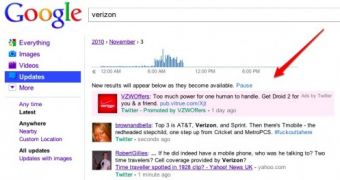In a landmark move for both companies, Twitter's Promoted Tweets are now being served in Google real-time search results. This is the first time Google has allowed another ad network to display ads on its search engine. This is also probably the first time Promoted Tweets, the search version, have been made available to third parties.
Promoted Tweets started showing up in the search results on Google yesterday, according to Search Engine Land, but not all users are seeing them yet. The feature is being rolled out to everyone at this moment.
While it may not seem like a big deal, it's a very interesting development for both companies.
Twitter has always said that it plans to offer its advertising platform to third-party developers with a revenue-split deal. This ensures that app developer gets a revenue source and that Twitter's ad network gets a wider spread.
The company also said, last summer, that it plans to test the feature with a number of third-parties and that it will be a few months before it may be ready.
Yesterday, Twitter launched a new type of Promoted Tweets, ones that show up in the stream, in partnership with the HootSuite desktop client. This new type of paid tweets will be eventually rolled out on Twitter.com and for other parties.
However, Google serves the regular type of Promoted Tweets, the ones that are displayed for searches on Twitter.com. In fact, they work exactly the same, if you see a Promoted Tweet on Twitter you should see the same tweet for the same search on Google.
Note that the promoted tweets don't appear on the main Google search results page, which sometimes features real-time results. The Promoted Tweets are only available in the dedicated "Updates" section which provides real-time search results.
Google had already partnered with Twitter to get access to the full data firehose for its search features. Google gets the standard 50/50 revenue split that all other third-parties will get.
The move is much bigger for Google than it is for Twitter as it is the first time it has integrated a third-party ad network on its main page. Ads from other ad networks could be served on Google Search, but only via the AdSense platform.
Google makes a big chunk of its huge revenue from the ads it serves on its own sites, especially the search engine. However, the company is under increased scrutiny for its dominance of the search market.
Enabling third-party ad networks on the search engine, even if the move is bound to be insignificant on the larger scale, as is the case with Twitter, could go a long way towards appeasing authorities.

 14 DAY TRIAL //
14 DAY TRIAL //